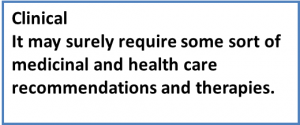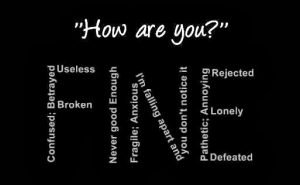”People think depression is sadness, crying, dressing in black. But people are wrong. It is a constant feeling of being numb.Being numb to emotions & being numb to life. You wake up in the morning just to go back to bed again”.
 We all go through various transient phases in different time periods of our life.Some of these phases make our lives totally changed from the one we are spending before that traumatic tragedy. These sudden changes affect our lives too badly that we sometimes don’t even come to know that what actually is going on.
We all go through various transient phases in different time periods of our life.Some of these phases make our lives totally changed from the one we are spending before that traumatic tragedy. These sudden changes affect our lives too badly that we sometimes don’t even come to know that what actually is going on.
The ratio of people who are able to cope with such traumatic situations is very small as compared to the ones who are unable to withstand such traumatic situations and go on drowning into this dramatic phase.
By this, they develop persistent feelings of distress, hopelessness, sadness, lack of interest in pleasurable activities and inability to focus or concentrate on various tasks. Such persistent feelings are actually lead towards a sort of medical illness, known as Depression.
Depression is an illness that can affect anyone, regardless of age, race, class, or gender. About 10% to 25% of women and 5% to 12% of men are expected to suffer from mental illness or depression at some point in their lives. Further research has depicted that about 1 in 5 women and 1 in 10 men usually suffer from depression at some point in life.
The expectancy of depression is more in adults than in children and adolescents. Depression’s are caused by a complex combination of biological, psychological, environmental, and social factors which vary from person to person. It is considered that the stressful and traumatic events may trigger depression in most of the individuals.
There are certain myths regarding depression’s. Like some people think that depression is not a common condition, as it is very rare to occur. Some people think that it not a medical illness. According to some people depression is just associated with poor people of the society and they do not believe that depression can also affect the elite class of the society.
Others think that there are no effective and permanent treatments for eliminating depression’s and a very wrong notion regarding treatment of depression is that its medications are very addictive.
The above discussed views regarding depression are just myths as the reality is totally opposite to it. Depression is a common condition it can appear at any time in a person’s life as its expectancy ratio varies from person to person.
Depression is considered as a serious medical illness, it cannot be ignored at any cost. Moreover, it is the world’s leading cause of disability, and has been linked to chronic diseases like heart disease, diabetes, migraine etc. It is not associated with the people who are devoid of basic necessities of life; even it can afflict the person who is leading a luxurious life.
As nobody seems to be perfect and a kind of deficiency of any sort is always present in everybody’s life which makes him depressed despite of having all the facilities of life which a poor person lacks in his life. This proves that depression is independent of race and class.
Moreover, People with depression can be treated with psychotherapy or talk therapy, medication, or a combination of both. The treatments for curing depression are normally very effective.
Medications which are used to cope with depression are not addictive or habit-forming. When the person is finished their treatment, the medication can be stopped.
Thus, we can say that “depression is the most prevalent mental illness which is associated with a complicated psychological and physical battle. It’s a medical condition characterized by long lasting feelings of intense sadness, hopelessness, helplessness and worthlessness.”
Phases of Depression’s:


When the phase of depression is mild, it is non-clinical phase and when the phase of depression becomes severe then it is clinical phase which means the person requires clinical assistance.

Symptoms Associated with Depression:
|
Physical Symptoms |
Changes In Thoughts |
Changes In Behavior |
Changes In Feelings |
|
Tiredness |
It’s my fault |
Social with drawl |
Anxiety |
|
Loss of energy |
I am failure |
Lack of mental focus |
Frustration |
|
Muscle pain |
I am worthless |
Difficulty in concentration |
Restlessness |
|
Poor appetite |
I am alone |
Excessive worrying |
Lacking confidence |
|
Weight gain/loss |
No one understands me |
Stop doing enjoyable activities |
Indecisiveness |
|
Insomnia/Oversleep |
Nothing good ever happened to me |
Cannot enjoy joyful moments |
Feeling guilty |
|
Headaches/stomachaches |
life is not worth-living |
Cant tackle with grief |
Prolonged sadness |
Causes of Depression:
Not known exactly.
Some factors causing depressive illness may include;
|
Biological Factors |
Psychological Factors |
Genetic Factors |
Environmental Factors |
|
Associated with abnormalities in brain messenger system which causes the level of serotonin, nor-epinephrine & dopamine to be abruptly diminished, leading to depression. |
Any sort of stressful and traumatic event may trigger onset of depressive illness (depression). |
A family history of having mental illness maybe transmitted to next generation. Person with family history of depression may certainly more prone towards developing depressive mind. |
Lack of confidence leads to social with drawl, which ultimately leads to isolation, making a person to feel helpless and lonely, thus indulge in depression. |
Cycle of Depression:
The cycle of depression continues until worrying stops.

Worldwide prevalence of Depression:
- 300 million people worldwide are victims of depressive illness.
- Single leading cause of disability around the world (2017 World Health Day).
- Second leading cause of death in 15-29 year old people.
- 322 million people or 4.4 % global population became victimized of depression in 2015 (latest statistics from WHO).
- Prevalence of depression in women is greater (5.1%) than in men (3.6%).
Prevalence in Pakistan:
- Pakistan is one of the vulnerable countries having high level of depression.
- According to Dr. Iqbal Afridi (President of Pakistan Psychiatric society), out of 200 million people in Pakistan; one out of three people suffer from depression.
- A study conducted by Agha Khan University in the year 2005-6 had shown that 34% people were diagnosed with depression.
- According to Express Tribune News Report, depression affects 44% of entire population of Pakistan annually. 57.5% of females and 25% of males are affected with depression annually in Pakistan.
Alarming Situation:
- Only 750 trained psychiatrists are present in Pakistan.
- Only 1 psychiatrist; for 10,000 patients.
- Only 1 child psychiatrist; for 4 million children having mental health issues.
- Just 4 major psychiatric hospitals are for entire population.
Hence, it can be said that depression’s is hiding of emotions in a way like not to tell others about the state of your mind.

Thus, despite common misperceptions, depression is not a sign of weakness but stigma and discrimination is preventing people from seeking the care and importance they need (WHO).
So, the most important thing which we need to understand is that,
‘’ Prevention is not in our hands, early detection & acceptance is’’.
Author: Soha Navaid (BS HONS PHYSIOLOGY)
Department of Physiology, GCUF.
Acknowledgment:
Thanks to all the beloved Teachers & my lovely Parents who have given me an aptitude to excel in my working. Very special thanks to Dr. Ghulam Hussain, Dr. Arsalan Shaukat & Ma’am Humaira Muzaffar who have guided me in every kind of matter and also empowered my literary writing skills.